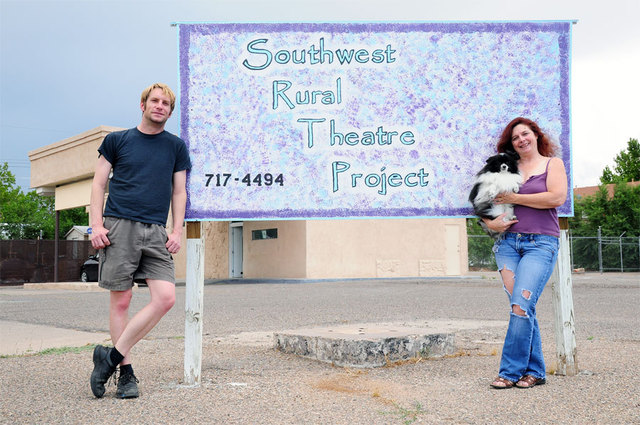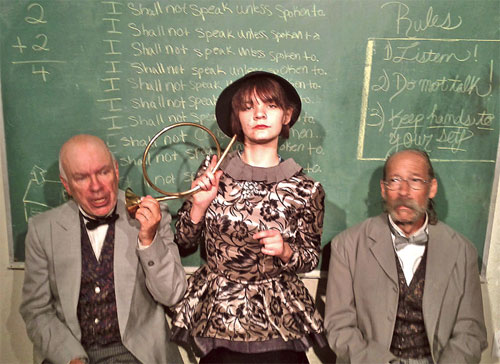When Leslie Joy Coleman was an undergrad at New Mexico Highlands University, she had an experience that forever changed her understanding of theatergoing. Her professor arranged for buses to bring students from outlying schools to see You’re a Good Man, Charlie Brown. “The show was supposed to start in the dark, and the light cue would come on one of the first lines,” Coleman says. “So here we go, we’re going to start the show. Down come the house lights, and as soon as it goes completely dark, all the kids start hootin’ and hollerin’. We tried to start, but you couldn’t hear the first lines over the noise. And standing there in the dark, I thought to myself, They’ve never been exposed to this, so they don’t know.” That’s when Coleman, who grew up north of Las Vegas, N.M., realized how little experience rural communities can have with theater. When I meet Coleman at what she calls the SouthWest Rural Theatre Project’s “storefront” space, construction is in full swing: paint cans, power tools, and half-finished “rocks” and other scenery litter the room. Jason Deuter, a member of the board of directors, gives me a tour while discussing the company’s upcoming production, Because Their Hearts Were Pur e, or The Secret of the Mine, a good old-fashioned melodrama that Deuter is directing. “We’re the only theater in Albuquerque that allows you to throw marshmallows at the villain,” he says proudly. (This sort of audience participation is a staple in the genre of melodrama.) “We even sell them to you and donate the money to a local food bank.”“And I will never cancel a show,” says Coleman.Deuter points to an instance where only one person showed up for a performance. “It was one elderly man and it almost looked like he had the beginning of Parkinson’s.”“We performed,” says Deuter. “We gave it our all. He threw marshmallows. I threw marshmallows. We had a great time.”The next day the man came back during a rehearsal. He wasn’t there to watch, just to deliver a message: "You guys performed for me last night and I was the only person and you still did the show, and I wanted to give you this."“It was a thank-you card with a $50 check in it,” Deuter says. They still have that card.Since its inaugural production in August 2011, SWRTP has launched three storefront productions and completed three micro-tours, but the company has yet to embark on a more widespread venture. SWRTP is still learning how move into any space that’s thrown at them. “If we’re going to go touring rurally, it’s not like we’re going to go find a theater or an auditorium, even,” Coleman says. The most recent stint included shows at six assisted-living facilities and a performance Downtown as part of Albuquerque’s Centennial celebrations. They weren’t quite on the road yet, but they were getting closer. “I’m thinking, OK, it’s not rural, but hopefully we’re somehow serving people,” Coleman says, adding, “They loved us. You couldn’t mistake the need.”For its production of The Miracle Worker (next up after Because Their Hearts Were Pure ), SWRTP is reaching out to sign-language interpreters, and also plans to have at least one performance devoted to a blind audience. Attendees will be invited to walk on stage before the performance, to touch the set, and even the actors, in order to deepen their experience of the play. And soon after that the company is approaching a big milestone: A trip to Artesia (and hopefully a few other locations) is planned for the coming months. Still, Coleman’s aspirations stretch much further. “I want to serve the entire Southwest—New Mexico, Colorado, Arizona,” she says. “My vision is way bigger than anyone wants me to talk about.”Coleman hopes to develop a model for holding community workshops in schools along tour routes, a week or two before the rest of the company arrives. Kids could then perform in the show—giving them a rare chance to not only see theater, but participate in it as well. The company also has plans for a program that will help local playwrights publish on a small scale. And Coleman aspires to someday have multiple plays running in repertory. “Somebody somewhere could call and say they wanted a comedy, say they wanted Neil Simon, say they wanted somebody specific. We would be able to provide that.”Coleman envisions a future in which SWRTP has an efficient touring schedule and a large company comprised of the casts of multiple shows. “Bus No. 2 is going to Tucumcari!” she says dreamily. “I can already see myself doing that.” For now, though, the company is sustained by a small core of actors and technicians passionate about its mission, all of them volunteers. Forget a fleet of buses—just one would be good, along with portable light and sound systems. SWRTP could also use an experienced grant-writer, not to mention performers and collaborators for upcoming projects.Coleman says she had some naysayers when she began this project. After all, Albuquerque boasts more theater ensembles per capita than just about any city in the U.S. “But what I said to them was, I’m not doing theater just for Albuquerque. I believe that this is something that no one else is doing, and I believe even if five other companies were doing it, it wouldn’t be enough.”
Because Their Hearts Were Pure, or The Secret of the Mine Runs through July 29Fridays, 8 p.m.Saturdays, 7 p.m.Sunday, July 22, 2 p.m.Sunday, July 15 and 29, 6 p.m.SouthWest Rural Theatre Project5800 Kathryn SE (corner of Kathryn and Alvarado) Tickets: $12, $10 students and seniors, $8 kids under 12717-4494, swrtp.org












